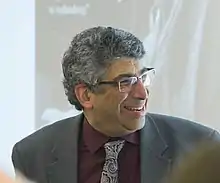Andrew B. Bocarsly
Andrew Bruce Bocarsly (born April 23, 1954) is currently a professor at Princeton University, New Jersey. His primary research interests lie in physical inorganic chemistry.[1] He conducts research in electrochemistry, photochemistry, solids state chemistry, and fuel cells, and is known for his work on alternate energy solutions involving processes and materials for photo-reduction and electro-reduction.[2][3][4]
Andrew B. Bocarsly | |
|---|---|
 | |
| Born | April 23, 1954 Los Angeles, California, USA |
| Nationality | American |
| Alma mater | University of California, Los Angeles, Massachusetts Institute of Technology |
| Scientific career | |
| Institutions | Princeton University |
Education and career
Bocarsly graduated with a B.S., magna cum laude, from the University of California, Los Angeles with a double major in chemistry and physics (June 1976). There he worked with John Gladysz on research involving metal vapor synthesis. In June 1980 he received his PhD from Massachusetts Institute of Technology for research on charge transfer processes on semiconductors. Starting in 1980, he was assistant and associate professor at Princeton University where he is currently full professor. Bocarsly currently teaches the second course of the introductory General Chem sequence at Princeton. [5]
Carbon dioxide
Bocarsly's publications include around 200 refereed journal papers,[6] multiple patents,[7][8] and the edited book Fuel Cells and Hydrogen Storage (2011).[9] Bocarsly has published on catalysts for the reduction of carbon dioxide to organic products.[10][11][12] With Emily Barton Cole, he has worked on the selective conversion of carbon dioxide to methanol.[13][14] [15][16] This interest in artificial photosynthesis led to the founding of the company Liquid Light in 2009.[13][17][18][19][20]
Awards
Bocarsly has been recognized with the following awards.[3][6]
- Alfred P. Sloan Fellow (1986–1988)[21]
- American Chemical Society, EXXON Solid State Chemistry Fellowship (1984)[22]
- The Camille and Henry Dreyfus Foundation Newly Appointed Faculty Grant (1980)
- DuPont Young Faculty Grant (1980)
- Sigma Pi Sigma - National Physics Honor Society
- President's Undergraduate Research Fellowship UCLA (1975)
Footnotes
- American Chemical Society. Committee on Professional Training (2005). Directory of Graduate Research. Washington: American Chemical Society. pp. 799–800.
- Khan, Fahd S. (20 April 2016). "Princeton University's Visiting Student Research Collaborator (VSRC) program". Friends of UTokyo. Retrieved 21 May 2019.
- "Andrew B. Bocarsly Professor of Chemistry" (PDF). Princeton University.
- Kincade, Kathy (November 6, 2013). "Turning Greenhouse Gases into Gold NERSC simulations reveal reaction mechanism behind CO2 conversion into carbon-neutral fuels and chemicals". Lawrence Berkeley National Laboratory. Retrieved 21 May 2019.
- "Plenary speakers". International Conference on Carbon Dioxide Utilisation 2016. Retrieved 21 May 2019.
- White, James L.; Baruch, Maor F.; Pander, James E.; Hu, Yuan; Fortmeyer, Ivy C.; Park, James Eujin; Zhang, Tao; Liao, Kuo; Gu, Jing; Yan, Yong; Shaw, Travis W.; Abelev, Esta; Bocarsly, Andrew B. (7 October 2015). "Light-Driven Heterogeneous Reduction of Carbon Dioxide: Photocatalysts and Photoelectrodes". Chemical Reviews. 115 (23): 12888–12935. doi:10.1021/acs.chemrev.5b00370. OSTI 1418443. PMID 26444652.
- "Patents by Inventor Andrew B. Bocarsly". Justia. Retrieved 22 May 2019.
- "Patents by Inventor Andrew Bocarsly". Justia. Retrieved 22 May 2019.
- Bocarsly, Andrew; Mingos, David Michael P., eds. (July 29, 2011). 'Fuel Cells and Hydrogen Storage. Springer Science & Business Media.
- Parker, Hilary (December 21, 2009). "Celebrate Princeton Invention: Andrew Bocarsly". Princeton News. Retrieved 21 May 2019.
- Yan, Yong; Zeitler, Elizabeth L.; Gu, Jing; Hu, Yuan; Bocarsly, Andrew B. (17 September 2013). "Electrochemistry of Aqueous Pyridinium: Exploration of a Key Aspect of Electrocatalytic Reduction of CO to Methanol". Journal of the American Chemical Society. 135 (38): 14020–14023. doi:10.1021/ja4064052. PMID 23972003.
- Paris, Aubrey R.; Chu, An T.; B. O'Brien, Conor; Frick, Jessica J.; Francis, Sonja A.; Bocarsly, Andrew B. (15 May 2018). "Tuning the Products of CO Electroreduction on a Ni Ga Catalyst Using Carbon Solid Supports". Journal of the Electrochemical Society. 165 (7): H385–H392. doi:10.1149/2.0791807jes. S2CID 104835529.
- Biello, David (September 23, 2010). "Reverse Combustion: Can CO2 Be Turned Back into Fuel?". Scientific American. Retrieved 21 May 2019.
- "New Jersey and Virginia Convert CO2 into Ethanol for US Gov". West Virginia Coal Association. August 3, 2015. Retrieved 21 May 2019.
- Barton, Emily E.; Rampulla, David M.; Bocarsly, Andrew B. (May 2008). "Selective Solar-Driven Reduction of CO to Methanol Using a Catalyzed p-GaP Based Photoelectrochemical Cell". Journal of the American Chemical Society. 130 (20): 6342–6344. doi:10.1021/ja0776327. PMID 18439010.
- Barton Cole, Emily; Lakkaraju, Prasad S.; Rampulla, David M.; Morris, Amanda J.; Abelev, Esta; Bocarsly, Andrew B. (25 August 2010). "Using a One-Electron Shuttle for the Multielectron Reduction of CO to Methanol: Kinetic, Mechanistic, and Structural Insights". Journal of the American Chemical Society. 132 (33): 11539–11551. doi:10.1021/ja1023496. PMID 20666494.
- Alperin, Michele (July 28, 2010). "Liquid Light Wastes Not, but Hopes for a Lot". Princeton Info. Retrieved 21 May 2019.
- Dunn, Laura Emily (March 2, 2015). "Women in Business Q&A: Dr. Emily Cole, Co-Founder, Liquid Light". HuffPost. Retrieved 21 May 2019.
- Levine, Barry; Rogers, Stewart (December 23, 2014). "Find out who made VentureBeat's first 'Naughty & Nice' list". VentureBeat. Retrieved 21 May 2019.
- Levine, Barry (July 3, 2014). "Princeton researchers use sunlight to convert CO2 more efficiently than plants do". Venture Beat. Retrieved 22 May 2019.
- "90 SCIENTISTS WIN RESEARCH GRANTS". The New York Times. March 9, 1986. Retrieved 21 May 2019.
- "ExxonMobil Award Faculty Fellowship in Solid State Chemistry". American Chemical Society. Retrieved 21 May 2019.